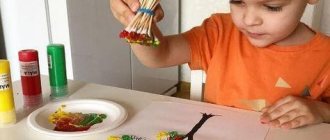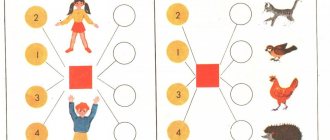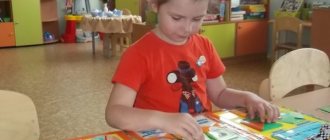Development of mathematical abilities through didactic gamesconsultation
Consultation for parents.
Development of mathematical abilities through didactic games.
In preschool age, play is of utmost importance in the life of a small child. The need for play in children continues and occupies a significant place even during the first years of their schooling. In games there is no real conditioning by circumstances, space, time. Children are the creators of the present and the future. This is the charm of the game.
Have you heard the following parable: “I tried to reach the child’s heart with words, but they often passed by him unheard. I tried to reach his heart with books, he gave me puzzled looks. In despair, I turned away from him. “How can I get to this child’s heart? “I exclaimed. He whispered in my ear: “Come play with me!” »
Learn by playing! In order for young children to master the necessary movements, speech, and various skills, they must be taught this.
Didactic games were created to teach children. Their main feature is that the task is presented to the child in a playful way. Children play without suspecting that they are mastering some knowledge, mastering the skills of operating with certain objects, and learning a culture of communication with each other. Any didactic game contains cognitive and educational game components and game actions. The selection of didactic games for teaching children mathematics is carried out in accordance with program requirements. Each didactic game should be aimed at solving a particular educational problem. The didactic game only partly meets the requirements of a complete systematic knowledge: sometimes it is an “explosion of surprise” for children from the perception of something new, unknown; sometimes the game is “search and discovery”, and always the game is joy, the children’s path to their dreams. Filling learning with emotional and cognitive content is a feature of the didactic game.
Mathematics plays a huge role in mental education and in the development of a child’s intelligence. Currently, in the era of the computer revolution, the common point of view expressed in the words: “Not everyone will be a mathematician” is hopelessly outdated. We must remember that mathematics is one of the most difficult academic subjects. Therefore, one of the most important tasks of educators and parents is to develop a child’s interest in mathematics in preschool age. Introducing this subject in a playful and entertaining way will help the child in the future to master the school curriculum faster and easier. Mathematics has a unique developmental effect. Its study contributes to the development of memory, speech, imagination, emotions; forms perseverance, patience, and creative potential of the individual. A “mathematician” plans his activities better, predicts the situation, expresses his thoughts more consistently and accurately, and can clearly justify his position.
Parents think that kindergarten is not such an important event in their children’s lives. Many parents believe that the main thing when preparing for school is to introduce the child to numbers and teach him to write, count, add and subtract. The stock of memorized knowledge ends very quickly, and the lack of formation of one’s own ability to think productively (that is, to independently perform the above-mentioned mental actions on mathematical content) very quickly leads to the appearance of “problems with mathematics.” Children, regardless of age, are involved in solving simple creative problems: finding, guessing, revealing a secret, composing, modifying, matching, modeling, grouping, expressing mathematical relationships and dependencies in any available way. Children develop the ability to find the answer to the constant question: “how?” One of the important directions in solving this problem is the creation of conditions that ensure the full mental development of children, associated with the formation of stable cognitive interests, abilities and skills of mental activity, mental qualities, creative initiative and independence.
With the help of didactic games, the teacher teaches children to think independently and use the acquired knowledge in various conditions in accordance with the task. A didactic game allows you to individualize work, give tasks that are feasible for each child, taking into account his mental and psychophysical capabilities, and maximize the development of each child’s abilities. The child’s attention is focused on the game, on completing game tasks, and meanwhile he overcomes difficulties of a mathematical nature, transfers his existing knowledge to a new environment.
Thus, didactic games make it possible to provide the required number of repetitions on a variety of material, constantly supporting and maintaining a positive attitude towards the mathematical task, which is embedded in the content of the game.
When using didactic games, various objects and visual material are widely used, which helps ensure that classes are held in a fun, entertaining and accessible way.
Didactic games for the formation of mathematical concepts are conventionally divided into the following groups:
1. Games with numbers and numbers
2. Time travel games
3. Space navigation games
4. Games with geometric shapes
5. Logical thinking games
These games can be presented in different forms, be it printed board games, verbal games (assignments, riddles, conversations, sentences), or plot games.
When using didactic games, I use a variety of objects and visual material, which helps ensure that the lessons are fun, entertaining and accessible. To form elementary mathematical concepts in preschoolers, I use various types of didactic games, for example:
1. Games with objects: “Assemble a pyramid”, “Assemble a matryoshka doll”, “Build a turret”, etc. The purpose of these games is to help consolidate the qualities of objects (size, shape, color).
2. Games for sensory development:
- to fix the color of an object: “Multi-colored beads”, “Put a bouquet in a vase”, “Let’s treat the bear with a berry”, etc. By playing these games, children learn to group and correlate objects by color.
- to fix the shape of an object: “Assemble a pyramid? ”, “Circle, Square”, “Patches for the rug”, “Mand your pants”, etc. In these games, children learn to distinguish, group objects by shape, and insert objects of a given shape into the holes corresponding to them.
- to consolidate the size of an object: “Big and small”, “Which ball is bigger”, “Let’s treat the bear”, etc. These games teach children to distinguish, alternate, and group objects by size.
The development of children's cognitive activity, their curiosity, and the desire for independent search is one of the main tasks in the development of a preschool child. Experience working with children of senior and junior preschool age shows that with the correct, systematic and creative use of didactic games with mathematical content and universal didactic material, significant progress in the development of cognitive activity can be achieved.
In my opinion, didactic games with mathematical content are of great importance for the successful involvement of a child in serious educational activities, for a better understanding and consolidation of mathematical material, for the development of cognitive activity in children
Intellectual development of children of senior preschool age through FEMP
Municipal budgetary institution
additional education
children's creativity center in Temirgoevskaya village
“Intellectual development of children of senior preschool age through FEMP”
Additional education teacher
education FEDORTSOVA E.P.
Temirgoevskaya village, 2020
“Intellectual development of children of senior preschool age through FEMP”
Preschool childhood –
a very important period in the life of children.
It is at this age that every child is a little explorer, discovering with joy and surprise the unfamiliar and amazing world around him, and in order for every little person to feel confident in the future, to be able to find the right way out of the current situation, to make a quick decision, it is necessary to deal with it intellectual development
. Raising and teaching children in the “Firefly” studio is educational in nature and takes into account two areas of children’s acquisition of knowledge and skills: the child’s extensive communication with adults and peers, and the organized educational process.
«Smart childhood
“lays a good foundation for the intellectual activity of the individual.
Preschool age
- a favorable period for the development of intelligence, it is at this time that progressive changes occur in many areas, mental processes (attention, memory, perception) are improved, personal qualities are actively developed, and on their basis - abilities and inclinations.
Preschool age
– this is the beginning of a long road into the world of miracles, knowledge and discoveries. It is at this time that children lay the foundation for further learning. And the main task of the teacher is to teach them not only to count and read, but above all to think.
Development of intellectual abilities of preschool children
– one of the pressing problems of our time. Preschoolers with developed intelligence remember material faster, are more confident in their abilities, adapt more easily to a new environment, and are better prepared for school.
The basis of human intelligence
, its sensory experience is laid down in the first years of a child’s life. In preschool childhood, the formation of the first forms of abstraction, generalization of simple conclusions, the transition from practical to logical, the development of perception, attention, memory, and imagination occurs.
Intellectual abilities in preschool children
develop better if you adhere to, as psychologists believe, the principle of a high level of difficulty in your work. When a child does not face obstacles that can be overcome, their development is weak and sluggish.
Each child is talented in his own way, each has significant creative potential. Intellectual abilities are not a talent, but a skill that one can develop.
So what is the intellectual development of a child?
Child's intellectual development
– the sum of knowledge and skills, the ability to assimilate and apply this knowledge in solving non-standard situations. But it should be understood that the RRI is not predetermined. Therefore, we teachers who are interested in RRI must direct the child’s energy in the right direction.
Intellectual development of children
– is of particular importance for preparing children for school. After all, it is important not only what knowledge a child has by the time he enters school. And is he ready to acquire new knowledge, is he able to reason, fantasize, draw independent conclusions, and create ideas for essays, drawings, and designs?
The leading role in intellectual development belongs to systematic intellectual education.
a huge role in mental education and development of intelligence .
It is known that Mathematics
– a powerful factor in the intellectual development of a child, the formation of his cognitive and creative abilities.
Children are amazingly active and inquisitive; they simply, like a sponge, absorb everything that happens around them.
Development of elementary mathematical concepts
- This is an extremely important part of the intellectual and personal development of a preschooler. And the success of his further education largely depends on how well and in a timely manner the child is prepared for school.
In teaching children to develop elementary mathematical concepts, I set myself the goal
– to create in pupils an interest in mathematics, to develop the ability to think independently, reason, analyze, understand its significance for subsequent learning, to give the child the feeling that he can cope, that he can learn not only the particular concepts of mathematics, but also general laws. Create a situation of success, and most importantly, experience the joy of overcoming difficulties.
Mathematics
– has a unique developmental effect.
Mathematics is the queen of all sciences
! And it’s hard to disagree with this, because the world around us exists in space and time. It is tangible, quantifiable, measurable. We use knowledge of mathematics every day.
She clears her mind!
Its study contributes to the development of memory, speech, imagination, and emotions.
And although mathematics is one of the most difficult subjects, our students should never learn about it, because our goal is to teach the child to comprehend this science with interest and pleasure.
I believe that teaching children mathematics in preschool age contributes to the formation and improvement of intellectual abilities: logic of thought, reasoning and action, flexibility of the thought process, ingenuity and ingenuity, and the development of creative thinking.
Practice has shown that preschoolers show cognitive interest in mathematics only when they are intrigued and amazed by something unknown to them. In this case, the information looks interesting, almost magical, in their eyes. Our task is to make FEMP classes entertaining and unusual.
The educational standard of the new generation sets new goals for preschool education that require new educational technologies.
A modern preschooler, to successfully study at school, must be able to:
1. Ponder.
2. Gain knowledge independently.
3. Think.
4. Make decisions.
5. Present the product.
Modern educational technology, more than ever, relies on the intellectual development of a preschooler. Game learning fully corresponds to this concept.
Everyone loves to play: both adults and children.
A preschool child is a person who plays, therefore the standard stipulates that learning enters the child’s life through the gates of children’s play.
The relevance of the topic is due to the fact that a child’s personal qualities are formed in active activities, and above all in those activities that are leading at each age stage and determine his interests, attitude to reality, and the characteristics of relationships with people around him. In preschool age, such a leading activity is play.
What is a game?
Play is an activity in which a child first emotionally and then intellectually masters the entire system of human relationships.
A game -
What could be more interesting and meaningful for the guys! This is joy, knowledge, and creativity. This is what a child comes to our studio for.
Features of the game for preschoolers:
— the game is the most accessible and leading type of activity;
- play is an effective means of shaping all aspects of a child’s personality, his moral and volitional qualities;
- all psychological new formations originate in the game;
-game is an important means of mental education of a child, where mental activity is associated with the work of all mental processes.
It has long been proven that every child from birth is endowed with enormous mental potential, which, under favorable conditions, develops effectively and enables the child to reach great heights in his development, and only in play does the child joyfully and easily, like a flower under the sun, reveal his creative abilities and knowledge. In the game, perception, thinking, memory, speech are formed - those fundamental mental processes, without sufficient development of which it is impossible to talk about the development of the child’s intellect.
A game
- This is a natural, humane form of education for a child.
By teaching through play, we teach children not how it is convenient for us to give educational material, but how it is convenient and natural for children to take it. Without play, normal development of the brain and body is impossible. To understand the nature of play, its amazing potential, is to understand the nature of a happy childhood.
Children are the creators of the present and the future.
This is the charm of the game.
For preschool children, play is of exceptional importance:
Play is learning for them,
Play for them is work,
Play for them is a serious form of education.
Preschool age is the age of play.
In my work on the intellectual development of children, I use a comprehensive gaming method. It is based on educational games. “play” with children
into mathematics. But teaching mathematics to preschool children is unthinkable without the use of entertaining games, tasks, and entertainment. Children are very active in the perception of tasks - jokes, puzzles, logical exercises. They persistently search for a solution that leads to a result.
Of all the variety of entertaining mathematical material in preschool age, didactic games are most used .
The formation of mathematical concepts in children is facilitated by the use of a variety of didactic games.
Didactic games
– games in which cognitive activity is combined with gaming activity. On the one hand, a didactic game is one of the forms of influence of an adult on a child, and on the other hand, a game is the main type of independent activity of children.
They allow preschoolers to expand their knowledge, consolidate their ideas about quantity, size, geometric shapes, and teach them to navigate in space and time. That is why I pay great attention to didactic games in the process of FEMP; this is primarily due to the fact that their main goal is educational.
Namely, a game with educational elements that is interesting to a child will help in the development of a preschooler’s cognitive abilities.
Didactic games for the formation of mathematical concepts are conventionally divided into the following groups:
1. games with numbers and numbers.
2. time travel games.
3. games for spatial orientation.
4. games with geometric shapes.
5. games for logical thinking.
Independent play activity.
This type of activity is extremely important for the development of a child, since in independent games the ability to improve skill and intelligence is trained, and most importantly, an unlimited opportunity to invent and create is revealed.
Do you want your children to be capable and talented?
Then help them take the first steps on the steps of creativity, but... don’t be late and, while helping..., think for yourself!
By teaching children through play, I strive to ensure that the joy of play turns into the joy of learning!
Learning should be joyful!!!
Conclusion
: So, in my opinion, without the use of didactic mathematical games, the development of cognitive activity, logical thinking, memory, creativity and other personal qualities is impossible.
Their diversity and accessibility help us successfully plan and implement assigned tasks, both in collective and individual work with children, which is the key to the successful intellectual development of children of senior preschool age
and, as a consequence, their subsequent schooling.
Downloaded from www.znanio.ru
MAGAZINE Preschooler.RF
Development of mathematical abilities of preschool children through didactic games.The leading activity of preschool children is play. A didactic game is a verbose, complex, pedagogical phenomenon: it is a gaming method of teaching preschool children, a form of teaching children, an independent play activity, and a means of comprehensive education of a child.
In teaching preschoolers the basics of mathematics, didactic games are given an important place. Not much time is devoted to this area of teaching. I think it’s in vain. After all, through mathematics, children learn to think logically, reason, look for relationships, form quantitative, spatial and temporal concepts, and also develop thinking abilities, attention, and memory.
The relevance of this problem is caused by a number of reasons: the high demands of schooling, the abundance of information received by the child, increased attention to computerization, and the desire to make the learning process more intense. But practice shows that not all children have a mathematical mindset, not all have a natural attraction to the exact sciences, and not all children show interest in mathematics.
In order to help children develop mathematical abilities, to instill, if not love, then the importance of mathematics, it is necessary to create certain conditions:
- organize a subject-development environment in a group in which the game library is of utmost importance (well-chosen games contribute to solving educational problems and develop children’s interest in intellectual work, initiative and need for this type of activity)
- comply with such pedagogical principles as systematic and consistent, accessible and attractive, taking into account the intellectual and psychological potential of the child
- be competent in organizing and conducting didactic games.
Didactic games can be very different: games with numbers and numbers, time travel games, games for spatial orientation, games with geometric shapes, games for the development of logical thinking. BUT the most important thing is that they bring joy to children, that they are interesting to children.
I will give several examples of games that were made by me and the parents of my students. These were the games that children liked the most and used in independent activities.
1. "Find Your Friends"
Goal: development of attention, orientation in space, knowledge of geometric shapes.
Each child holds in his hands a geometric figure (circle, triangle, square) of a certain color (red, yellow, blue, green). On the command “Find a friend by color, by shape ,” the child must look at his figure and find a friend with the same figure or color as his.
2. "Collect the pizza"
Goal: consolidation of knowledge of numbers, accounts, quantities.
The players (up to 6 people) take the form in the form of a slice of pizza, choose a pizza recipe, and depending on the recipe, lay out the ingredients in the specified quantity. This game can also be used to study parts of a whole.
3. "Journey Through Fairy Tales"
Goal: to consolidate the ability to navigate in space, to introduce the concepts of “left” , “right” , “up” , “down” . Develop the ability to act according to the proposed scheme, based on guidelines. Foster a love of fairy tales.
The magnetic board depicts a map of a fairy-tale kingdom, with the houses of fairy-tale characters. The players' task, based on the schemes, is to visit one of the heroes, and who exactly can be visited according to one or another scheme will become known at the end of the journey. Magnetic bunnies help players along the way.
4. “Gather a bouquet for mom”
Goal: develop memory, attention, ability to take turns. Strengthen your knowledge of color.
The circles depict flowers (chamomile, aster, gladiolus) of different colors (red, yellow, blue). The circles are laid out face down on the table. One of the players throws a cube with colored edges and chooses a circle; if the flower depicted on the circle is the same color as the color on the edge of the cube, the player takes this circle for himself, if not, he puts it in the place where he took it. The one who collects the most flowers for mom wins.
The significance of these games lies in the fact that thanks to them, preschoolers actively master counting, use numbers, carry out elementary calculations visually and orally, master the simplest temporal and spatial relationships, and transform objects of various shapes and sizes. Playful activities contribute to the fact that children, without realizing it, are practically involved in simple mathematical activities, while mastering properties, relationships, connections and dependencies on objects and at the numerical level.
The conducted pedagogical diagnostics confirm the feasibility and importance of systematic and consistent pedagogical activities on the mathematical development of preschool children using didactic games.
| Next > |





